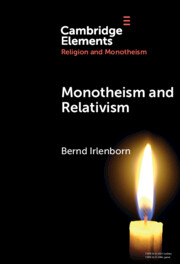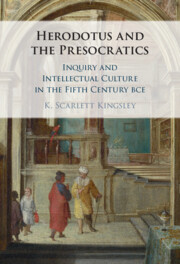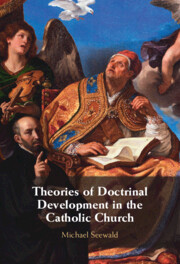Refine search
Actions for selected content:
58 results
3 - The Existential Unsettling of Security
- from Part II - Confronting Global Contradictions
-
- Book:
- Global Crisis and Insecurity
- Published online:
- 01 June 2025
- Print publication:
- 12 June 2025, pp 61-85
-
- Chapter
- Export citation
Expertise Explained
-
- Article
-
- You have access
- Open access
- HTML
- Export citation
6 - Relativism and Social Constructionism
- from Part I - Background and Basic Concepts
-
- Book:
- An Introduction to the Philosophy of Science
- Published online:
- 29 March 2025
- Print publication:
- 27 March 2025, pp 101-120
-
- Chapter
- Export citation

Monotheism and Relativism
-
- Published online:
- 06 February 2025
- Print publication:
- 06 February 2025
-
- Element
- Export citation
Chapter 3 - Samuel Butler
- from Part I - 1850–1900
-
-
- Book:
- The British Novel of Ideas
- Published online:
- 05 December 2024
- Print publication:
- 12 December 2024, pp 64-79
-
- Chapter
- Export citation
2 - Human Morality
-
- Book:
- Ethics and the Environment
- Published online:
- 29 November 2024
- Print publication:
- 28 November 2024, pp 25-44
-
- Chapter
- Export citation
Resistance and Reform as Responses to Human Rights Criticism: Relativism at FIFA World Cup Qatar 2022
-
- Journal:
- German Law Journal / Volume 24 / Issue 9 / December 2023
- Published online by Cambridge University Press:
- 19 March 2024, pp. 1691-1702
-
- Article
-
- You have access
- Open access
- HTML
- Export citation
2 - Universalism and Relativism, Minimalism and Maximalism
-
- Book:
- On Helping One's Neighbor
- Published online:
- 04 April 2024
- Print publication:
- 14 March 2024, pp 43-66
-
- Chapter
- Export citation
Chapter 7 - Herodotean Philosophy
-
- Book:
- Herodotus and the Presocratics
- Published online:
- 07 March 2024
- Print publication:
- 14 March 2024, pp 190-206
-
- Chapter
-
- You have access
- Open access
- HTML
- Export citation

Herodotus and the Presocratics
- Inquiry and Intellectual Culture in the Fifth Century BCE
-
- Published online:
- 07 March 2024
- Print publication:
- 14 March 2024
-
- Book
-
- You have access
- Open access
- Export citation
10 - The Articulation and Critical Review of Self-Normativity
- from Part II - Reflections on Some Theories and Doctrines
-
- Book:
- The Non-Coherence Theory of Digital Human Rights
- Published online:
- 22 February 2024
- Print publication:
- 29 February 2024, pp 108-120
-
- Chapter
- Export citation
13 - Thomas Kuhn and the Strong Programme
- from Part IV - Kuhn’s Impact on the Philosophy, Sociology, and History of Science
-
-
- Book:
- Kuhn's <i>The Structure of Scientific Revolutions</i> at 60
- Published online:
- 05 January 2024
- Print publication:
- 18 January 2024, pp 235-253
-
- Chapter
- Export citation
1 - The Limits of Moral Clarity
- from PART III - DO MODERATES HAVE A POLITICAL VISION?
-
- Book:
- Why Not Moderation?
- Published online:
- 12 October 2023
- Print publication:
- 12 October 2023, pp 77-83
-
- Chapter
- Export citation
Chapter 6 - Perfecting Literary History
-
- Book:
- The Politics and Poetics of Cicero's <I>Brutus</I>
- Published online:
- 06 July 2023
- Print publication:
- 20 July 2023, pp 165-190
-
- Chapter
-
- You have access
- Open access
- HTML
- Export citation
4 - Agonistic Pluralists
- from Part I - Intellectual Sources and Disciplinary Engagements
-
-
- Book:
- The Cambridge Handbook for the Anthropology of Ethics
- Published online:
- 11 May 2023
- Print publication:
- 25 May 2023, pp 96-129
-
- Chapter
- Export citation
2 - Moral and Political Philosophy
- from Part I - Intellectual Sources and Disciplinary Engagements
-
-
- Book:
- The Cambridge Handbook for the Anthropology of Ethics
- Published online:
- 11 May 2023
- Print publication:
- 25 May 2023, pp 35-64
-
- Chapter
- Export citation
Introduction
-
- Book:
- A History of Nihilism in the Nineteenth Century
- Published online:
- 10 March 2023
- Print publication:
- 30 March 2023, pp 1-34
-
- Chapter
- Export citation

Theories of Doctrinal Development in the Catholic Church
-
- Published online:
- 18 February 2023
- Print publication:
- 23 March 2023
8 - The Mentalist Theory of Ethics and Law
- from Part III - Rights and Moral Cognition
-
- Book:
- Mind and Rights
- Published online:
- 09 February 2023
- Print publication:
- 16 February 2023, pp 402-461
-
- Chapter
-
- You have access
- Open access
- HTML
- Export citation
